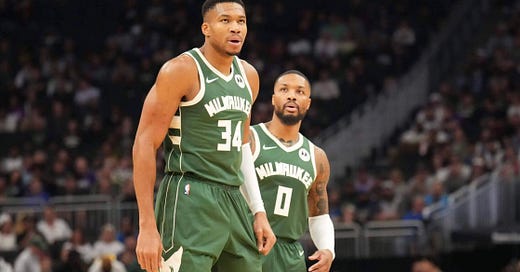Sports gives us particularly vivid illustrations of both superb and dreadful leadership. The field of play leaves little room for ambiguities. Instead, there are actions that serve a team’s development, cohesion, and ability to win games. And there are actions that undermine them.
Last week provided a stunning example of sports leadership at its best, offering lessons for anyone who leads a team. It came in the closing seconds of the opening season game between the Milwaukee Bucks and the Philadelphia 76ers.
The Bucks were up by 2 points with half a minute left, plenty of time for Philly to win. Damian Lillard, acquired just five weeks earlier by Milwaukee from the Portland Trail Blazers, had played superbly throughout the opener, thrilling fans. But he was still the new guy on the block.
Giannis Antetokoumnpo, Milwaukee’s Nigerian-Greek superstar and team captain, had the ball with 20 second to go until the buzzer. As a two-time NBA MVP who’d led Milwaukee to its first championship in 50 years in 2021, Giannis had the authority and the right to make the move that would seal the game.
Lillard, playing his first game with the Bucks, moved into position, signaling that he was available if Giannis wanted him to take the ball. But he also made it clear he knew it was Giannis’s decision.
That’s when Giannis, though he had a good path to the basket, passed the ball to Lillard. Who immediately drew a canny foul that set him up to make two free throws, which dropped in cleanly. Philly responded, but it was too late. Lillard’s savvy move had put Milwaukee too far ahead.
Watching the action felt remarkable. Here was the head, heart, and soul of the Bucks offering a guy who’d been there barely a month the chance to win the first game of the season. Giannis of course knew that Lillard was shooting at historic levels that night, and had been the league’s top closer when he was with Portland. Yet it was still shocking to see a superstar captain trust a brand new hire, however accomplished, to take such an important game home.
And to shine the spotlight on a player who could easily be viewed as threatening his own standing as the undisputed face of his team.
Afterward, Giannis explained, “I just wanted us to win.” Note the word us: not “I just wanted to win.”
When leaders go awry, it’s often because they’re thinking of me instead of us, of I instead of we: “My vision for this company...” “Under my leadership…” “The thing I most want to accomplish…” “What I’m proudest of…”
Such language is not inspiring. It does not build a culture of belonging. Nor does it serve our ability to rise together. Instead, it tends to set the stage for the indulgence of superstar behaviors that undermine morale. In the office as well as in sports.
By contrast, giving others the opportunity to shine in the service of a larger goal, even if it means sacrificing your own chance to be the hero, defines leadership at its most effective.
We routinely confuse superstars with leaders, but they are not the same. Leaders serve the team or organization by eliciting skilled performances from others. Superstars grab every chance to demonstrate their own skills. It’s fun to watch, and can make for thrilling games as well as entertaining flameouts, but it’s not leadership. In the first game of the season, Giannis confirmed his role as a leader by demonstrating generosity and trust.
Like what you’re reading? Click here to order my most recent book Rising Together from Amazon. Also available from your favorite bookseller. Thank you for your support!





